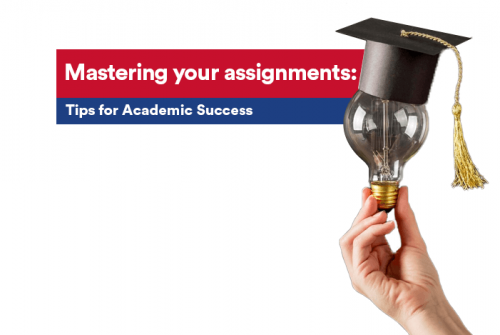
Mastering Your Assignments:
Tips for Academic Success

While studying in the United Kingdom may be an exciting and rewarding experience, it can be a bit frightening too, especially when it is a whole new country with different assignment patterns. Why else would it be scary? Well, because in some universities, students are graded based on their assignments. However, transitioning to a new school system and academic expectations can be difficult, particularly when it comes to the assignments. So, I've brought a few recommendations with me to help all of the students who plan to study in the UK.
To help you prosper in your academic path, here are some useful suggestions for tackling assignments effectively:
Before you begin your work, be sure you completely comprehend the task at hand. Take the time to carefully study and analyze the assignment requirements, making sure you understand the formatting criteria, word count restrictions, preferred referencing style, and any other instructions offered by your lecturers. If any part is still unclear, do not hesitate to request clarification from your tutors or instructors. Understanding the assignment criteria upfront prepares you for a focused and well-executed assignment, which will eventually contribute to your academic achievement.
Effective time management is essential for academic achievement, particularly in terms of meeting deadlines and creating high-quality work. It is important to develop a study schedule that allows enough time for each stage of the assignment process, such as research, writing, and revision. Breaking down tasks into smaller, more manageable tasks reduces overload and allows for greater organization. Students can stay on track and make consistent progress towards finishing their projects by setting up certain time windows for each work. This approach not only helps fulfill deadlines, but it also improves the overall quality of the assignment.
Many Nepalese students may not speak English as their first language. Take advantage of your university's resources, such as language assistance services, workshops, and language exchange programmes. To improve your English skills, practice writing and speaking on a regular basis.
Gathering information from reputable sources is essential for supporting your arguments and ideas in academic tasks. Begin by looking into scholarly publications, which include academic articles relevant to your topic. These sources have been extensively reviewed by professionals in the field to ensure the trustworthiness and accuracy of information. Furthermore, check books written by respected researchers and specialists, as they provide in-depth analysis and insights into your topic. Online databases provide a massive storage of scholarly literature, allowing you to read research papers and publications from a variety of subjects. Finally, examine credible websites linked with academic institutions, or reputable organizations, as they frequently contain useful data, statistics, and studies on your issue.
If you have any questions or concerns about your assignment tasks, do not hesitate to seek help from your teachers, tutors, or classmates. They are there to help you along your academic journey. Make the most of office hours, which allow you to have one-on-one interactions with your teachers to clarify questions and receive guidance. Additionally, joining study groups allows you to engage with classmates, share thoughts, and brainstorm ideas. Furthermore, use comments from prior assignments to improve your writing skills and meet the requirements of future work.
Handle assignments with a critical outlook, analyzing and assessing data from all angles. Demonstrate your capacity to think critically, engage with academic literature, and develop well-reasoned, evidence-based arguments.
Maintain academic integrity by correctly citing sources and referencing any ideas, quotes, or data that appear in your assignments. Familiarize yourself with the university's plagiarism policy and instructions for citing sources using the proper referencing style. Also, just a reminder that working with technology and AI may expose you to risks if the university finds the AI, thus it is best if you do it on your own.
Allow enough time for accurate proofreading and editing to guarantee that your assignments are of the caliber and accurate. To fulfill academic requirements, pay great attention to spelling, grammar, punctuation, and concept consistency. Use existing tools, such as writing centers or review programmes, to get more help and feedback. By following these methods, you will be able to improve your work and present polished assignments that demonstrate your academic competency and attention to detail.
So, the students studying in the UK can overcome academic challenges and succeed by following these advice and methods. They may overcome assignment problems, enhance their English language skills, and interact with the diverse academic community if they remain motivated, persistent, and open-minded. With determination and a good attitude, students can achieve academically and make the most of their time in the UK. Good luck!